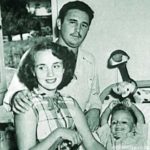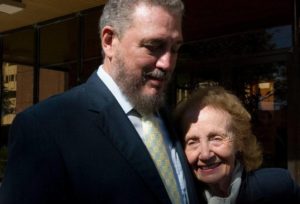Poor Fidelito. What else can be said about the suicide of Fidel Castro’s firstborn son? Of the death of a man who at his almost 70 years maintained the nickname of his childhood? He, the Revolution wasn’t his: he suffered it. It was not his vocation, but his destiny, already written at birth. A destiny that, as Fidel’s son, he could not even think about challenging. Who knows how many times he lived as a prison.
He was born on September 1, 1949, from the marriage of Fidel Castro to Mirta Díaz-Balart. Fidel was like that: son of a Galician who became rich but remained a rustic peasant, always a pariah among the bourgeoisie with whom he studied in the Jesuit schools. Towards his class, a visceral hatred that lasted all his life matured, the same hatred that the rural and Catholic Spain in which he had been formed had for the liberal customs and for the United States, guilty of infecting them to the pure and innocent Cuban people.
However, he always fell in love with women who were the mirror of that same bourgeoisie: beautiful, blonde, rich, cultured, sophisticated and of excellent manners. How to sublimate in that way the pain of rejection suffered. Mirta, Fidelito’s mother, corresponded perfectly to that portrait. More than anyone: the Diaz-Balart were part of the Eastern bourgeois elite, something much more relevant than their relationship with Batista, who did not have a hair of the bourgeois.
Since childhood, therefore, the child was a political hostage: sometimes from the father, sometimes from the mother’s family. He was kidnapped and stolen from each other and Fidel exhibited him triumphantly when he entered Havana in January 1959. Did the father love him? It is assumed. Did the father consider it? Not at all. Because for Fidel it was not a matter of family affection: there was history in between, a mission to which both had to submit, although he had chosen it and Fidelito did not. Who, like Fidel, considered himself a man of providence invested with the mission of redeeming humanity from sin, could not have a family as a common mortal. Do priests have a family? The Warriors?
Fidelito, therefore, could never be a child before, nor a man later. He lived the life of the father and could not live his. Dead Fidel, he began to die too. He always had to occupy the place that Fidel had assigned him in his redemptive plan, he had to perform the function received in the sacred order of the Revolution. Certainly, it was not because of his vocation that at the age of thirteen his father sent him to the Soviet Union. It was Fidel who wanted to make the son a luminary of nuclear engineering, convinced that this would be the future. And when Fidel’s dream broke in Chernobyl and collapsed with the Soviet Union, he sacrificed his son: he torpedoed him because of incompetence on the cover of Granma.
As a somewhat fanatical and egotistical Quixote, a teacher of everything and knowledgeable about nothing, Fidel had many absurd and deleterious dreams: he dreamed that Cuba would become richer than the United States and that the socialist revolution would break out in the United States; he assured that the West was declining and that the Soviet Union would triumph, because that is what the laws of history said, that he wanted to know. He dreamed that Cuba would produce better cheeses than France, more milk than Holland, more citrus than Israel, that would export in large quantities all that it always had to import. Why not dream of being a nuclear power? Would not it help to redeem humanity? That would be your son’s homework! When finally his dreams turned into nightmares of which others paid the consequences, he was not a man to recite the mea culpa: God is not wrong. The fault was then the Empire, the counterrevolutionaries, the defeatists, the same people, who never became as virtuous as he wanted. Why not the son too? Fidelito had been directing the Cuban atomic energy agency for twelve years: “there is no monarchy,” said the monarch father when he was kicked out.
Poor Fidelito. He could not even imagine his life, because his father would crush anyone under his demanding capitals: Heroism, Sacrifice, Morals, People, Homeland, Death. A deafening symphony of trombones. It is no coincidence that in the constant search for the dynastic succession that could one day take over the reins of Cuba, no children of Fidel appear. They are all Raúl’s children and grandchildren, cruel and affectionate, methodical and ruthless, a man of power and family. Better: Family, with a capital letter.
Fidelito is the metaphor of Cuba and its dramatic history. Who knows what great talents I would have developed if I had been free. Who knows what great humanity we have lost. From that metaphor, suicide is the key.
(OPINIÓN) FIDEL CASTRO DÍAZ-BALART, FIGURA METAFÓRICA DE LA REALIDAD CUBANA.
Pobre Fidelito. ¿Qué más se puede decir sobre el suicidio del primogénito de Fidel Castro? ¿De la muerte de un hombre que a sus casi 70 años mantenía el sobrenombre de su infancia? Él, la Revolución no la hizo: la sufrió. No fue su vocación, sino su destino, ya escrito al nacer. Un destino que, como hijo de Fidel, ni siquiera podía pensar desafiar. Quién sabe cuántas veces lo habrá vivido como una prisión.
Había nacido el 1 de septiembre de 1949 del matrimonio de Fidel Castro con Mirta Díaz-Balart. Fidel era así: hijo de un gallego que se hizo rico pero siguió siendo un campesino rústico, siempre fue un paria entre los vástagos de la burguesía con quienes estudió en los colegios jesuitas. Hacia su clase, maduró así un odio visceral que duró toda la vida, el mismo odio que la España rural y católica en que se había formado tenía por las costumbres liberales y por Estados Unidos, culpables de contagiarlas al puro e inocente pueblo cubano.
Sin embargo, se enamoró siempre de mujeres que eran el espejo de esa misma burguesía: bellas, rubias, ricas, cultas, sofisticadas y de excelentes modales. Cómo para sublimar de esa manera el dolor del rechazo padecido. Mirta, la madre de Fidelito, correspondía a la perfección a ese retrato. Más que nadie: los Díaz-Balart formaban parte de la élite burguesa oriental, cosa mucho más relevante que su vinculación con Batista, que de burgués no tenía un pelo.
Desde la infancia, por lo tanto, el niño fue un rehén político: a veces del padre, a veces de la familia de la madre. Lo secuestraron y se lo robaron el uno al otro y Fidel lo exhibió triunfante cuando ingresó a La Habana en enero de 1959. ¿El padre lo amaba? Se supone. ¿El padre lo consideró? Para nada. Porque para Fidel no era una cuestión de afecto familiar: estaba la historia de por medio, una misión a la que ambos debían someterse, aunque él la hubiese escogido y Fidelito no. Quien, como Fidel, se consideraba a sí mismo un hombre de la providencia investido con la misión de redimir a la humanidad del pecado, no podía tener una familia como un mortal común. ¿Los sacerdotes tienen familia? ¿Los guerreros?
Fidelito, por lo tanto, nunca pudo ser un niño antes, ni un hombre después. Vivió la vida del padre y no pudo vivir la suya. Muerto Fidel, comenzó a morir él también. Tuvo siempre que ocupar el lugar que Fidel le había asignado en su plan redentor, tuvo que desempeñar la función recibida en el sagrado orden de la Revolución. Ciertamente, no fue por su vocación que a los trece años su padre lo envió a la Unión Soviética. Fue Fidel quien quiso hacer del hijo una lumbrera de la ingeniería nuclear, convencido de que ese sería el futuro. Y cuando el sueño de Fidel se quebró en Chernobil y colapsó con la Unión Soviética, sacrificó a su hijo: lo torpedeó por incompetencia en la portada de Granma.
Como un Quijote algo fanático y egolatra, profesor de todo y conocedor de nada, Fidel tuvo muchos sueños absurdos y deletéreos: soñó que Cuba se haría más rica que los Estados Unidos y que en los Estados Unidos estallaría la revolución socialista; aseguró que Occidente estaba declinando y que la Unión Soviética triunfaría, porqué así lo decían las leyes de la historia, que él pretendía conocer. Soñó que Cuba produciría mejores quesos que Francia, más leche que Holanda, más citricos que Israel, que exportaría en grandes cantidades todo lo que siempre tuvo que importar. ¿Por qué no soñar con ser potencia nuclear? ¿No lo ayudaría a redimir la humanidad? ¡Esa sería la tarea de su hijo! Cuando finalmente sus sueños se convertían en pesadillas de las cuales otros pagaban las consecuencias, él no era hombre que recitara el mea culpa: Dios no se equivoca. La culpa la tenían entonces el Imperio, los contrarrevolucionarios, los derrotistas, el mismo pueblo, que nunca llegaba a ser tan virtuoso como él quería. ¿Por qué no el hijo también? Fidelito había estado dirigiendo la agencia cubana de energía atómica durante doce años: “no hay monarquía”, dijo el padre monarca al echarlo.
Pobre Fidelito. Ni siquiera pudo imaginar su vida, porque su padre aplastaría a cualquiera bajo sus exigentes mayúsculas: Heroísmo, Sacrificio, Moral, Pueblo, Patria, Muerte. Una sinfonía ensordecedora de trombones. No es coincidencia que en la búsqueda constante de la sucesión dinástica que algún día podría tomar las riendas de Cuba, no aparezcan hijos de Fidel. Son todos hijos y nietos de Raúl, cruel y afectuoso, metódico y despiadado, un hombre de poder y familia. Mejor: Familia, con mayúscula.
Fidelito es la metáfora de Cuba y de su dramática historia. Quién sabe qué grandes talentos habría desarrollado si hubiera sido libre. Quién sabe qué gran humanidad hemos perdido. De esa metáfora, el suicidio es la clave.
Agencies/La Nación/Loris Zanatta/Internet Photos/ Arnoldo Varona/ TheCubanHistory.com
THE CUBAN HISTORY, HOLLYWOOD.



 > (OPINION) FIDEL CASTRO DÍAZ-BALART, A Metaphorical Figure of the Cuban Reality. <> (OPINIÓN) FIDEL CASTRO DÍAZ-BALART, Figura Metafórica de la Realidad Cubana. (Photos).
> (OPINION) FIDEL CASTRO DÍAZ-BALART, A Metaphorical Figure of the Cuban Reality. <> (OPINIÓN) FIDEL CASTRO DÍAZ-BALART, Figura Metafórica de la Realidad Cubana. (Photos).






